by Karl Soehnlein
This took place in 1990. Gay Pride weekend, New York City.
Back then, Gay Pride was more defiant, fueled by an urgency that just isn’t there today. We had no AIDS treatments, no state recognition of our relationships, no hate crimes legislation. Anti-gay violence was at a peak. If you cast your “queer eye” on a straight guy you’d get beaten for it. In New York, we were reeling from the brutal murder of Julio Rivera, a gay guy from Queens, the Matthew Sheppard of our day. My friends and I silk-screened t-shirts that featured a purple fist next to the words QUEERS BASH BACK.
Which is not to say that Gay Pride weekend wasn’t a celebration. It was, complete with floats and balloons and wigs and glitter and leather and go-go dancers and a sense of hope. On Sunday, the big parade would move down Fifth Avenue and turn at the Washington Square Arch to make its way toward the Village, toward the Stonewall Inn, where the whole movement had been born twenty years earlier. Where once had occurred a riot between drag queens and the police, now stood the souvlaki grills and t-shirt kiosks of the post-parade street fair.
This story takes place the night before the parade, a Saturday evening at the end of June. The sidewalks were overflowing in the West Village. It might have started as an official gathering of the Radical Faeries, with a speaker or two talking politics the mic, but it grew into a party too big to be contained. My friends and I and the people around us—the activists mixed in with the out-of-towners looking for fun and the onlookers checking things out—had taken over the streets that bordered Sheridan Square. And then we were moving, pushing out of the Square in a steady, exuberant flow up Sixth Ave., pushing our way against traffic, and then stopping traffic altogether. Bringing downtown Manhattan to a halt on a Saturday night, just because we could.
We revived the old Stonewall era war-cry, “Out of the closet, into the streets,” and our numbers swelled. All kinds of people wanted to get in on the power of the moment—power that came not from slogans or t-shirts, but from presence, this nonviolent show of strength. There were too many of us for the cops to push back on the sidewalk, so even though laws were being broken (jaywalking, disturbing the peace, etc.), the police turned their attention to holding back or redirecting traffic. I remember how happy I felt, amazed that this had spontaneously bloomed into something so big.
We had turned off Sixth onto one of the side streets, further messing with motorists who were stuck with nowhere to go. If an angry driver yelled at the crowd to get out of the way, our chant would morph into, “Out of your cars and into the streets.” Some people did get out of their cars, giving themselves over to the spectacle, turning up the volume on their car radios and dancing on their hoods. Others just looked helpless and angry, which didn’t bother me. Why should society go on as it always did, in this neighborhood, on this night of all nights, the anniversary of the birth of our revolution? The world was out of whack, and our community was suffering greatly, we who paid taxes but were denied benefits, who gave politicians our votes but got so little in return, who were beaten in the streets and blamed for it. In some temporary but potent way, we were tipping the balance of power. Tipping it just enough to remind the rest of the world what we already knew: that the social contract was in a state of disorder, and something had to be done, even a symbolic something like jamming the streets with people having too much fun to care about the rules.
The night ticked on, the sky getting darker, the traffic situation hopeless. Every now and then a driver would try to squeeze through an opening in the crowd, pleading his case through his window. But even if he found a sympathetic ear, the mob was too big, too set on its ambling course, to split apart and let him pass. Inevitably these cars just got themselves in deeper, encircled like an island in a sea of queer flesh.
These little clashes became more prevalent, and I started to feel the temperature rise, the hostility increase. Drivers were laying on their horns, yelling insults from half-rolled down windows. Every now and then a tough guy would stand outside his door and threaten whomever was nearby, threats that might be met with reciprocal insults and on-the-spot political diatribes, or blown kisses and wit.
My own tactic was to ignore. I was doing my best to ignore one guy in particular. He wore a polo shirt and a backwards baseball cap and was standing on the pavement next to his open car door, his arms waving furiously, his voice commanding, “You people better get the fuck out of my way.” His car, a smallish, red four-door, was trapped on Jane Street near the corner of Seventh. His girlfriend, prettied-up for a night out in the city, sat in the passenger seat, her face resigned to the delay, to being on the wrong side of this situation. Getting no satisfactory response, the guy yelled, “That’s it! Fuck this shit!”
He slid back into his car, slammed the door, gunned his engine. He gunned it again. Then he hit the gas, blasting into us. Those of us who had watched this unfold jumped back, shouted for others to do the same. He took advantage of this sudden parting and floored it, scraping past the revelers, sending people spinning and shrieking as rubber burned on the pavement. I saw a couple of older dykes lose their balance and topple to the ground.
The car careened sharply to the left, clump-clumping over the concrete curb, and swerved onto Seventh, which was empty for that stretch because we’d blocked access to it. I saw his red taillights blurring away. Those of us near enough to feel the adrenaline rush of having almost been run over reacted quickly and took off after him on foot, leaving behind a crowd buzzing from the commotion. Up ahead, we could the red car came to a stop at a traffic light. Now there were more of us chasing him, sensing that he wouldn’t get away. He must have sensed this too, because he didn’t wait for the green before he hit the gas again.
He made a right on Christopher Street, crowded with revelers for him to pick up speed. The guy running next to me, someone I had chatted with earlier, was now pulling cans of beer from a shoulder bag and hurling them toward the car. One land on the trunk with a thud and shoot out a spray of foam. We were closing the distance. People on the sidewalk were stopping to watch, trying to figure out what was going on.
I felt so many things in that moment: the fury of having watched that two-ton vehicle charge into a peaceful assembly; the hunger for revenge; the sickening fear that by chasing him we might be making it worse, that he might actually hit someone up ahead. He drove as far as the Lucille Lortel Theater, halfway down Christopher, and then couldn’t get any farther. The marquis was lit up, casting a glow onto the red car as the driver swerved toward the sidewalk and screeched to a halt, two wheels on the curb.
The car was immediately surrounded. We banged on it, shouting. The guy who’d been throwing beer cans swung his bag into the back window. I stepped closer, lifted my foot and kicked hard into a headlight. I could hear the screams of the girl in the passenger seat above the sound of the smashed glass. As I felt the tremor of the impact in my ankle and shinbone, I looked up through the windshield and saw the terror on the driver’s face. It stopped me cold. I hopped backwards, moving away from the mob. Someone else stepped in to the gap I’d left behind.
Next thing I knew the girlfriend had flung herself onto the sidewalk, clutching her purse, hobbling on high heels. The guy tumbled out after her, dragged her toward the box office. He was trying to reason with the angry faces surrounding him—“That’s my property!”—while voices shouted back at him, “You could have killed someone!”
I wondered if it was him who would be killed, wondered if I wanted to see that happen, right here, see him torn to bits. All that nonviolent love I’d been feeling had been overwhelmed by the toxicity of his aggression.
Just one year earlier I had been beaten by a couple of gaybashers who looked a lot like this guy; I went to court to testify against them, listened to the prosecutor lie to the jury that these boys had been defending themselves against my sexual advances. I had received the unbelievable news of their acquittal over the phone from a young district attorney fumbling through an apology. I had hung up the phone and hurled a glass full of vodka against the wall.
Part of me hungered to see this heedless driver sacrificed for that past injustice, for the helplessness I’d felt then.
Part of me was recoiling from this bloodlust, the way I’d recoiled from the car when I felt the headlight shatter beneath my boot.
I looked around. No one was in charge, but the crowd seemed to know what it needed to do. The driver and his girlfriend were abandoned as the full power of vengeance was turned on his property. As more of the original marchers arrived, the empty car—this weapon glowing in the light from the marquee—was swarmed.
Fists hammered the hood, the trunk, the doors. Legs were raised and aimed at the windows. I watched the glass break into spider webs. I watched someone climb to the roof and swing a heavy heel into the windshield, the impact frozen for a split second by a camera’s white flash. Streetlight rippled across the glowing red metal, dented and puckered under the nonstop barrage. A wall of bodies banded together, leaned against the vehicle, rocked it, tried to lift it off the ground.
I heard a chant start up, “Queers bash back, queers bash back,” and I joined in, shouting myself hoarse.
The cops at last arrived and shoved their way through, dispersing us before the car could be upended. I saw one of them find the driver, suddenly reanimated, his arms waving frantically in every direction. His girlfriend’s face had gone blank again.
As we backed away, the damage came into focus: tires flattened, glass shattered, paint scratched, mirrors torn off. Metallic pulp. Totaled. Even the roof was half-collapsed, as if a heavenly fist had descended through the night sky to target this puny machine.
Some folks approached the police to give them the story. I considered stepping forward as a witness, then thought better about it. I had engaged the legal system once before and it had gotten me nowhere. I moved away to find my friends, those same friends I had started the night with so carefree and happy. I was shaking. The last thing I saw was the cops leading the driver and his passenger into a police car. Getting their statement? Making an arrest? I didn’t know. As far as I could tell, not a single person who’d helped destroy the car was taken in.
The next morning, the cover of the New York Post showed a photo of the wrecked car. We were front page news. I don’t remember which details were laid out by the reporter; I don’t remember what happened to the driver; I don’t recall any witnesses quoted in the article. Maybe I didn’t even read the article beyond its headline, which seemed to me to say everything that I needed: QUEERS BASH BACK. On that celebratory Sunday, the documentation of the previous night’s retribution had become the image of our pride.
learn more about karl at kmsoehnlein.com
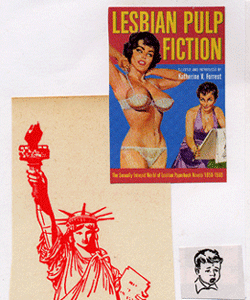
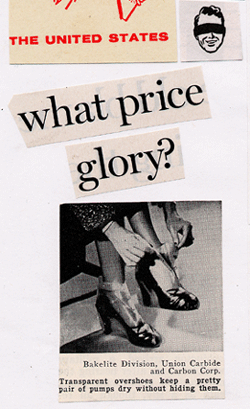

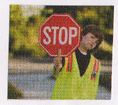




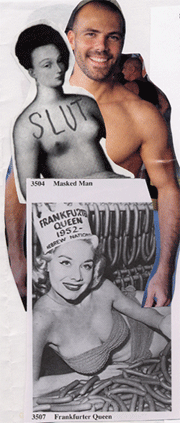

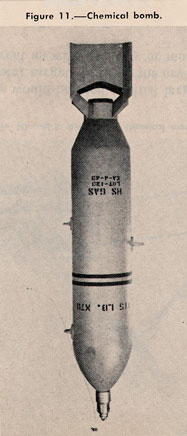
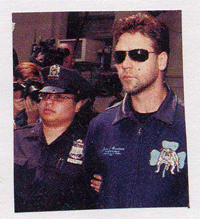
missalette #18 home page
missalette home page